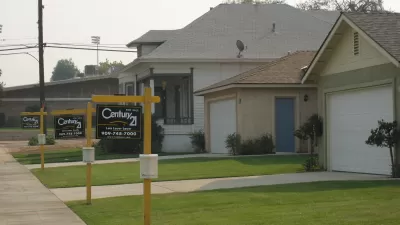A coalition of groups advocating for more funding for local communities and schools want to reform the landmark tax-cutting initiative by treating commercial and industrial properties different than residential, creating the so-called "split roll."

Voter approval of the "California Schools And Local Communities Funding Act," an initiated constitutional amendment sponsored by Schools and Communities First, a wide-ranging group of community organizations, education advocates, unions and foundations, would result in companies with 50 or more employers in the Golden State paying an additional $11 billion a year in property taxes to benefit local communities and schools, reports John Wildermuth for the San Francisco Chronicle.
Backers of the ballot initiative need 585,407 valid signatures to qualify it for the ballot. The 860,000 signatures they collected will be will be turned in to each of the state’s [58] counties for a raw count and verification and then reported to the secretary of state. It will be more than a month before the measure can officially qualify for the ballot.
By aiming the initiative for the November 2020 presidential ballot, supporters would guarantee a strong voter turnout.
Matt Levin of CALmatters reports that organizers received funding "from Bay Area philanthropic organizations such as the San Francisco Foundation and the Chan Zuckerberg Initiative (yes, that Zuckerberg)."
Proposition 13, which passed in 1978 with 63 percent of the voters, turned 40-years-old in June and continues to enjoy the support of a large majority of the state's voters. The initiated constitutional amendment (Article XIII A of the Constitution of the State of California) doesn't distinguish between commercial and residential property, and that's what the initiative's backers hope to change.
Under Prop. 13, all California property ... is reassessed only when it is sold. Houses and condominiums, however, can turn over every few years, while many large businesses occupy their land for decades — meaning some have not had property reassessed since Prop. 13 passed.
The initiative rolled back property assessments to 1976 levels and capped tax increases at 2 percent a year, as long as the property is not sold.
The proposed initiative "would require commercial and industrial property — but not homes and small businesses — to be regularly reassessed and taxed at their full value," adds Wildermuth.
The argument that split-roll supporters make is that it’s not fair that residential and commercial property are both taxed at the same rate. Since major developments like oil refineries, office buildings and amusement parks are rarely sold, their taxes fall further behind their actual value every year.
Jon Coupal, president of the Howard Jarvis Taxpayers Association, named after the man who put Prop. 13 on the ballot, responds. "If the business community loses its Prop. 13 protection, we’re next on the menu,” referring to the 95 percent of his members who are homeowners.
On Thursday, The Chronicle printed their editorial in support of the initiative.
There’s plenty to like in a split roll tax system to replace the lopsided world of Prop. 13 property levies. Businesses, not homeowners, are the big winners in holding down yearly tax bills under the 1978 law that’s endured despite its built-in flaws.
The overall intention is bona fide crowd-pleaser. The proposal is backed by a dream team alliance of unions, civic foundations and school groups. The extra levies collected from business properties would be split between local government and public education.
The editorial closes with the hope that the initiative "is just a start on the much bigger challenge of writing a fair tax system."
Related:
- Questions about Prop. 13? The California Legislative Analyst's Office answers them via Planetizen in a useful, easy-to-read guide published in September 2016.
- On the California November 2018 ballot: Proposition 5, Property Tax Transfer Initiative: an initiated constitutional amendment that would reform Prop. 13. Unlike the California Schools And Local Communities Funding Act, "the nonpartisan Legislative Analyst’s Office [LAO] has estimated the change would cost local governments and schools a combined $300 million a year, with costs rising to $2 billion annually over time," as reported by the Los Angeles Times via Planetizen.
FULL STORY: Big change in California’s Proposition 13 could be headed to ballot

Planetizen Federal Action Tracker
A weekly monitor of how Trump’s orders and actions are impacting planners and planning in America.

Maui's Vacation Rental Debate Turns Ugly
Verbal attacks, misinformation campaigns and fistfights plague a high-stakes debate to convert thousands of vacation rentals into long-term housing.

Restaurant Patios Were a Pandemic Win — Why Were They so Hard to Keep?
Social distancing requirements and changes in travel patterns prompted cities to pilot new uses for street and sidewalk space. Then it got complicated.

In California Battle of Housing vs. Environment, Housing Just Won
A new state law significantly limits the power of CEQA, an environmental review law that served as a powerful tool for blocking new development.

Boulder Eliminates Parking Minimums Citywide
Officials estimate the cost of building a single underground parking space at up to $100,000.

Orange County, Florida Adopts Largest US “Sprawl Repair” Code
The ‘Orange Code’ seeks to rectify decades of sprawl-inducing, car-oriented development.
Urban Design for Planners 1: Software Tools
This six-course series explores essential urban design concepts using open source software and equips planners with the tools they need to participate fully in the urban design process.
Planning for Universal Design
Learn the tools for implementing Universal Design in planning regulations.
Heyer Gruel & Associates PA
JM Goldson LLC
Custer County Colorado
City of Camden Redevelopment Agency
City of Astoria
Transportation Research & Education Center (TREC) at Portland State University
Jefferson Parish Government
Camden Redevelopment Agency
City of Claremont





























